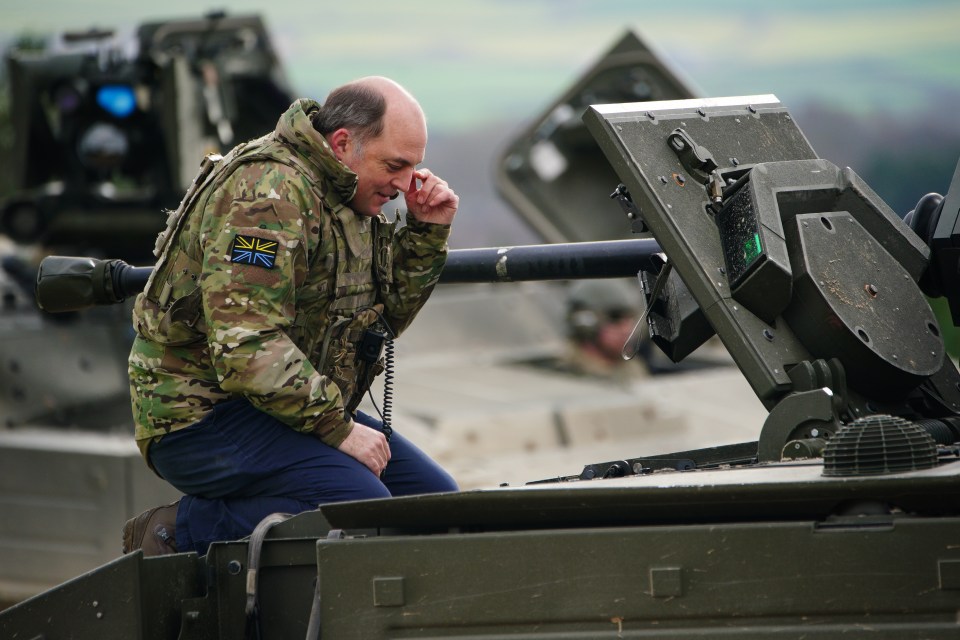If Ben Wallace takes the helm of NATO it could be a boost for Global Britain

If Ben Wallace becomes the head of NATO, he’ll leave a big hole to fill at the Ministry of Defence. But it would be good for the UK’s international standing, writes Eliot Wilson
The prime minister was in Washington DC last week to meet president Biden. While there, it is believed, he pressed the case for Ben Wallace to be the next secretary-general of NATO. The incumbent, the former Norwegian premier Jens Stoltenberg, will step down at the end of September after nine years in the job, longer than any other secretary-general except Joseph Luns who stayed in post from 1971 to 1984.
Britain’s defence secretary is not the only candidate in this unannounced jostle. The Danish prime minister, Mette Frederiksen, has also been in the US, and has been bruited as a candidate – she would be the first woman to lead the Alliance. Recently, however, she has seemed to shy away from the idea. Kaja Kallas, the Estonian premier, has also been mentioned. She is a fluent and persuasive communicator, but some NATO leaders think her too hawkish, and believe that a secretary-general from a state which borders Russia would hardly lower the temperature of international relations (though in one sense that shouldn’t matter).
Three of the 13 NATO chiefs have come from the United Kingdom: Lord Ismay, the first post-holder, Lord Carrington, and Lord Robertson of Port Ellen. Given that the position is never held by an American, and that France has a complicated relationship with the Alliance which would preclude a French candidate, Britain’s dominance is striking. Wallace is a very plausible candidate, which begs two questions: can he become the next secretary-general, and should he?
Ben Wallace has been among the Conservative Party’s front ranks for a long time. He was elected to the House of Commons in 2005, and before that was a Member of the first Scottish Parliament. He has impressive defence credentials: he served as a regular officer in the Scots Guards for seven years, including in Northern Ireland. His ministerial career has also been largely security-focused. After a year as a government whip, he served in the Northern Ireland Office before being appointed security minister at the Home Office by Theresa May.
As the minister responsible for counter-terrorism, cyber security, domestic state threats and, after 2017, economic crime, he was in charge of responding to the Westminster Bridge attack, the Manchester Arena bombing and the London Bridge attack in 2017, and the Salisbury poisonings in 2018. When Boris Johnson sacked the able, pro-Brexit but Jeremy Hunt-supporting Penny Mordaunt as defence secretary in 2019, Wallace seemed the obvious replacement (after Hunt had turned it down).
This summer Wallace will celebrate his fourth anniversary as defence secretary: only Denis Healey and Geoff Hoon have served longer. He has been an influential figure, securing significant increases in the defence budget, and has been in the thick of the UK’s support for Ukraine since the Russian invasion in February 2022. This has made him a well-kent face on the international security circuit; he has forged working relationships with politicians across the Alliance.
This network of connections, combined with his extensive CV, would make him an effective secretary-general, able to begin tackling NATO’s agenda from his first day. Heading this agenda will be issues arising from Ukraine: containing Russia, maintaining US commitments to European security, and dealing with the future enlargement of the Alliance.
Wallace can do the job, but should he? His departure from domestic politics would leave a noticeable gap. He’s one of the few heavyweight cabinet ministers who is not continuously manoeuvring for promotion. The Ministry of Defence would feel his loss too. Unless Mordaunt were to return as secretary of state, there is no “oven-ready” successor in cabinet. It would be left to someone like Tom Tugendhat, Jeremy Quin or James Heappey to step up, and it would not be a like-for-like swap, at least at first.
If it becomes clear that Wallace is NATO members’ preferred candidate, and he wants the job – he has said it “would be fantastic” – it would be outrageous to deny him because of his value to the current government. He would be an excellent NATO chief, with authority and expertise, and his presence in such a senior international post would be a fillip for British influence. Replacing him as defence secretary would be challenging, but Rishi Sunak should reflect that it is a nice kind of problem to have. An able British head of NATO would be a major boost for – I’m going to say it – Global Britain.